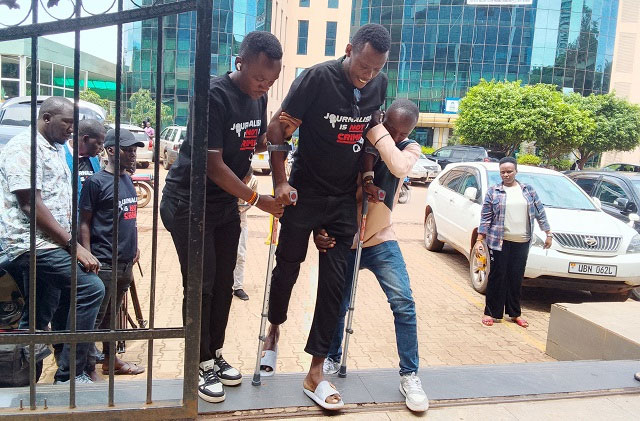
COMMENT | Olivia Nalubwama | In 2021, acclaimed Filipino journalist Maria Ressa won the Nobel Peace Prize (alongside Russian journalist Dmitry Muratov) in unprecedented recognition of the role of journalism in today’s world.
Underscoring the award, the Nobel Committee stated, “Free, independent and fact-based journalism serves to protect against abuse of power, lies and war propaganda.” The smiley diminutive Ressa rose to global prominence during the tenure of former Philippines president Rodrigo Duterte.
Popular and controversial, Duterte, dubbed the ‘Donald Trump of the East’, also ‘The Punisher’, was solidly shoot-to-kill, in his crackdown on drugs. In a presidential campaign speech, Duterte warned drug dealers and their ilk, “I have no patience, I have no middle ground. Either you kill me or I will kill you idiots.”
During his 2016-2022 tenure, he unleased ‘death squads’ to eliminate criminals; human rights reports estimate that between 12,000 and 30,000 people were killed during Duterte’s crackdown on drugs. Duterte publicly and explicitly encouraged the killings with statements like, “If they are there in your neighbourhood, feel free to call us, the police or do it yourself if you have the gun,” promising blanket immunity for the killers, according to the International Centre for Transitional Justice (ICTJ).
Activists reported that many of the victims were impoverished teenagers and young men shot by rogue gunmen and the police. ICTJ recounted that Duterte warned human rights advocates “not to pick a fight with me or you will lose.”
Ressa, alongside her media organization, Rappler, led the way in boldly calling out the impunity of extrajudicial killings by the Duterte regime. By 2018, The Guardian reported that Ressa took to wearing a bulletproof vest when she was on the road. By 2021, Ressa faced seven court cases ranging from tax evasion to cyber crimes, whose multiple sentences, threatened her with a 50-year imprisonment.
In 2018, TIME magazine honoured her alongside murdered Saudi journalist, Jamal Khashoggi. Highlighting these journalists as guardians of truth who faced great personal risks in their quest for the facts, speaking truth to power, TIME magazine stated, “…the strongmen of the world only look strong. All despots live in fear of their people. To see genuine strength, look to the spaces where individuals dare to describe what’s going on in front of them.”
Appearing on an American current affairs podcast, The Weekly Show, on March 7, Ressa speaks about the rise of authoritarianism and the dangers of social media sharing lessons from the blood-soaked tyranny of Duterte.
Lessons instructive for Uganda’s media in an increasingly militarised state. Ressa has immortalized her lifelong fight, “Without facts, you can’t have truth. Without truth, you can’t have trust. Without these three, we don’t have a shared reality, let alone solve existential problems like climate change. We can’t have journalism; we can’t have democracy.”
Dear reader, this demonstrates why journalists covering the Kawempe North by-election were deliberately targeted and brutalized by state security. This is war – a war on facts. As Ressa emphasizes, the facts anchor our shared reality.
That shared reality: if the incumbent National Resistance Movement (NRM) regime does not change course from its increasingly militant stance spearheaded by the president’s son and chief of the defence forces, Gen. Muhoozi Kainerugaba (MK), no one is safe.
The facts ensure citizens have the necessary data to make informed decisions. When the beleaguered journalists ask why the masked and heavily armed Joint Anti-Terrorism Task Force (JATT) hunted them like prey, Ressa implores journalists to understand their power.
In the age of misinformation/disinformation/fake news- the age of social media, journalism is on the frontline of truth. Ressa, referencing a groundbreaking 2018 study by the Massachusetts Institute of Technology (MIT), School of Management, shares that falsehoods on social media spread six times faster than the truth.
A mood study undertaken by her media organization, Rappler, found that viral posts have three key ingredients/moods: fear, anger and hate. On how misinformation distorts our shared reality, Ressa quotes Soviet politician and former KGB chairman Yuri Andropov, “Dezinformatsiya (Disinformation) works like cocaine. If you sniff once or twice, it may not change your life. If you use it everyday, though, it will make you into an addict — a different man.”
Reflecting on her experience covering the Duterte regime and how it used Facebook to push its narratives, Ressa explains that populist despots use fear/anger/hate for ‘engagement farming’ as a means to consolidate power and overwhelm the facts.
In this light, MK’s posts on his social media account are neither drunken missteps nor harmless banter. Ressa observes that such posts go viral as people are more likely to retweet/like them.
This works well for social media platforms whose algorithms are designed to keep us engaged with similar posts zoning us into our comfortable echo chambers. This engagement means more profit for social media companies, which Ressa sees as the bigger dictatorship.
Therafa, for MK every like, follow, and retweet of his ludicrous posts is a win showing the facts dust. When the media is beaten into submission, unable to cover the facts, the public is then disconnected from the facts. Without the facts, those in power reign unencumbered.
Ressa states because social media has made it difficult to separate fact from fiction, the media has to show who lies. For example, journalists have to provide more context instead of simply parroting the aggravating MK posts. The media has to maintain the facts – MK is a serving army officer in breach of the law and, therefore, operating with impunity and setting the country on a dangerous trajectory.
Ressa argues the war on facts today is the struggle of humankind against power – a struggle of memory against forgetting. Thus, journalism is an antidote to tyranny – unfortunately in the age of social media, facts are not profitable.
Traditional journalism is folding as crappy journalism and influencers get more clicks, and rake in more profits for social media companies. Dear reader, should journalists take to hiring beefy bouncers or take up defensive kickboxing to ward off state violence? How can journalists counter the beatings? Is a media blackout of government events sustainable?
In her book, How to Stand Up to a Dictator: The Fight for Our Future, Ressa explicitly defines the menace, “In an autocracy, a journalist’s opponent is the state — which makes policy, controls the police, hires the prosecutors, and readies the prisons. It has an army of bots active online to vilify and undermine anyone deemed an opponent.
It has the power to take down broadcasters and online sites. Most important: it has a need to control the message in order to survive. Its existence depends on ensuring that there is only one side to every story.”
She argues thus, “…to a lying government, a journalist is a terrorist, setting off bombs that blow up their lies.” Consequently, her advice to journalists is oddly simple: “Hold the line, link arms, do not voluntarily give up your rights”.
Sounds like a call for martyrdom, I hear a brutalized journalist mutter bitterly. Dear reader, wonder no more why JATT was deployed in all its glorious infamy to ‘handle’ journalists. Ressa asserts the media has to choose.
Choose to fight back early or they will be too weak to fight back later. When faced with a vindictive leader – one who will unleash JATT to ferociously beat up journalists, and keep them from delivering the facts to the citizenry, Ressa cautions media owners, “You have to imagine and be prepared for worst-case scenarios- you have to embrace your fear. You have to have a battle plan going in”.
She calls for unity- when one media house is attacked, will all media houses stand together to hold the line? Yet, the media needs backup. For Ressa, the line between journalism and activism is the citizenry. If the citizens do not stand up, and demand better, the media will not survive. Ressa entreats the citizenry to stand behind journalists.
Again, her remedy is alarmingly simple – citizen journalism. When facts are under attack, journalism is activism. When journalists are beaten, everyone else brutalized, every citizen with a smartphone becomes a journalist who can discreetly take a picture and share it on social media.
Today, Ressa continues her fight for democracy – most of her court cases melted away when Duterte left power. Ironically, the facts Ressa and others fought for are now the bedrock of Duterte’s current status – in the custody of the International Criminal Court facing crimes against humanity committed during his tenures as mayor and later president.
On why she chose to speak up even when the regime threw criminal cases, arrests, and coordinated online attacks (at the height, she received 990 hate messages per hour), 61-year-old Ressa stresses dictators only need to make an example of a few to make the people obey. She asks us, “What are you willing to sacrifice for the truth?”
*******
 Olivia Nalubwama is a “tayaad Muzukulu, tired of mediocrity and impunity” smugmountain@gmail.com
Olivia Nalubwama is a “tayaad Muzukulu, tired of mediocrity and impunity” smugmountain@gmail.com
THIS ARTICLE WAS FIRST PUBLISHED IN THE OBSERVER
 The Independent Uganda: You get the Truth we Pay the Price
The Independent Uganda: You get the Truth we Pay the Price



